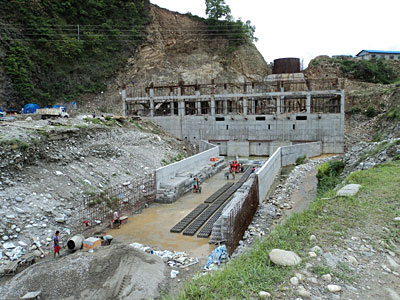 |
Anyone who looks at the figures should be worried. Nepal produces only 600MW of power and demand is 800MW. Since most projects are non-storage type, generation capacity depends on the flow of the rivers. Even in the monsoon, the rivers generate only 692 MW, and with energy demand rising at 80 MW a year, power rationing is here to stay for at least three more years. In fact, there may only be power for three hours a day in coming winters. Load-shedding is no just a nuisance to consumers, the fall in productivity and increase in diesel imports is ruining the economy.
The government has declared an energy emergency up to December 2015 during which period it hopes to fast track projects to generate 2,500 MW of additional power, including from reservoir projects. Parliament's Committee on Natural Resources, of which I am a member, has just completed a detailed study and has made some recommendations in a preliminary report.
At present, hydropower development is stymied by inadequate incentives for domestic and foreign investors, poor governance at the regulating agencies and line ministry. Politicisation of the NEA has now reached unprecedented levels: there are 13 unions affiliated to various parties in the NEA. Even if there is enough generation capacity, there isn't the transmission capacity to take the power to consumers. NEA's monopoly in generation, transmission and distribution has hindered competition and hampered efficiency. Some projects are being delayed because their environmental impact assessment isn't complete.
The preliminary report makes the following recommendations:
• Draw up a 50-year National Energy Security Plan and a medium term National Energy Plan within 12 months
l Forge a national consensus among political parties about a five-year National Hydropower Development Plan.
• Urgently draw up a data base of survey licenses for various projects
• Set up an all-party mechanism to remove obstacles for completion of projects undertaken by NEA, domestic private sector and foreign investors
• Launch construction of West Seti, Budi Gandaki reservoir project with new company and line up financing
• Provide government security and prevent strikes and shutdowns at power generation sites
• Address demand side issues like cutting pilferage and instituting institute time-of-day and seasonal tariff
• Expedite 10 projects of up to 25MW, for immediate relief from power cuts, fast track Upper Tama Kosi
• Make special request to five of Nepal's partner countries to build a project of more than 100 MW each
• Repair and operate 59MW of thermal capacity in Biratnagar, Duhabi and Hetauda
• Set aside 7 per cent of the budget for the next ten years for hydropower development, secure financing from international creditors
• Set up a National Transmission Company and draw up a grid masterplan
• Set up a National Power Trading Company
• Priority should be to meet base load before exporting power
The rate demand for energy is growing and hydro power is not able to keep up, thus increasing this country's dependence on imported fuel. Nepal's future development is only possible with hydropower, and the development of other renewables will help us attain self-sufficiency in energy. Each development zone should have a reservoir project to meet demand during the dry season. Energy from the cost-effective investment in hydropower should be invested in industry and processing should spur rural development.
Multi-purpose projects must provide irrigation to boost agriculture production. Most important all, given the importance of hydropower for the country's development, there is an urgent need for political consensus and continuity to future development of this sector. We have lost a lot of time, we cannot afford any more delays.
Gagan Thapa is a NC member of parliament's Committee on National Resources and has been involved with the draft report on water resources development.
Read also:
The urgency of the energy emergency, EDITORIAL
"Things will change"
Keep power politics out of power policy, SAROJ DAHAL
Power cuts here to stay into the 2020s unless corruption and politicisation are checked



